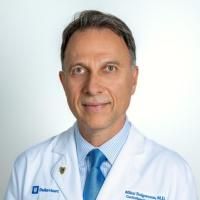Genome-wide association study of acute kidney injury after coronary bypass graft surgery identifies susceptibility loci.
Date
2015-10
Journal Title
Journal ISSN
Volume Title
Repository Usage Stats
views
downloads
Citation Stats
Abstract
Acute kidney injury (AKI) is a common, serious complication of cardiac surgery. Since prior studies have supported a genetic basis for postoperative AKI, we conducted a genome-wide association study (GWAS) for AKI following coronary bypass graft (CABG) surgery. The discovery data set consisted of 873 nonemergent CABG surgery patients with cardiopulmonary bypass (PEGASUS), while a replication data set had 380 cardiac surgical patients (CATHGEN). Single-nucleotide polymorphism (SNP) data were based on Illumina Human610-Quad (PEGASUS) and OMNI1-Quad (CATHGEN) BeadChips. We used linear regression with adjustment for a clinical AKI risk score to test SNP associations with the postoperative peak rise relative to preoperative serum creatinine concentration as a quantitative AKI trait. Nine SNPs meeting significance in the discovery set were detected. The rs13317787 in GRM7|LMCD1-AS1 intergenic region (3p21.6) and rs10262995 in BBS9 (7p14.3) were replicated with significance in the CATHGEN data set and exhibited significantly strong overall association following meta-analysis. Additional fine mapping using imputed SNPs across these two regions and meta-analysis found genome-wide significance at the GRM7|LMCD1-AS1 locus and a significantly strong association at BBS9. Thus, through an unbiased GWAS approach, we found two new loci associated with post-CABG AKI providing new insights into the pathogenesis of perioperative AKI.
Type
Department
Description
Provenance
Subjects
Citation
Permalink
Published Version (Please cite this version)
Publication Info
Stafford-Smith, Mark, Yi-Ju Li, Joseph P Mathew, Yen-Wei Li, Yunqi Ji, Barbara G Phillips-Bute, Carmelo A Milano, Mark F Newman, et al. (2015). Genome-wide association study of acute kidney injury after coronary bypass graft surgery identifies susceptibility loci. Kidney Int, 88(4). pp. 823–832. 10.1038/ki.2015.161 Retrieved from https://hdl.handle.net/10161/13721.
This is constructed from limited available data and may be imprecise. To cite this article, please review & use the official citation provided by the journal.
Collections
Scholars@Duke

Mark Stafford-Smith
My research interests are in the area of Cardiothoracic Anesthesiology. The main focus of my research is towards the understanding and prevention of acute kidney injury after cardiac and other major surgeries. Secondary interests include the study of analgesic strategies after cardiothoracic surgical procedures, performance of clinical trials, and perioperative transfusion and hemostasis.

Yi-Ju Li
My research interest is in statistical genetics, including statistical method development and its application for understanding the genetic predisposition of human complex diseases. Here is the list of research topics:
- Statistical genetics: development of family-based association methods for quantitative traits with or without censoring and for detecting X-linked genes for disease risk. With the availability of next generation sequencing data, we have ongoing projects to develop the association methods for testing rare variants for different phenotypic measures.
- Genetics of Alzheimer's disease (AD) and Fuchs endothelial corneal dystrophy (FECD).
- Genetic basis of age-at-onset of Alzheimer disease.
- Peri-operative genomic studies. Investigate the genetic risk factors for postoperative outcomes of patients underwent non-emergent coronary artery bypass grafting with cardiopulmonary bypass.

Joseph P. Mathew
Current research interests include:
1. The relationship between white matter patency, functional connectivity (fMRI) and neurocognitive function following cardiac surgery.
2. The relationship between global and regional cortical beta-amyloid deposition and postoperative cognitive decline.
3. The effect of lidocaine infusion upon neurocognitive function following cardiac surgery.
4. The association between genotype and outcome after cardiac surgery.
5. Atrial fibrillation following cardiopulmonary bypass.

Mihai V. Podgoreanu
Basic-Translational:
1. Systems biology approaches to modeling perioperative cardiovascular injury and adaptation.
2. Mechanisms of perioperative myocardial injury; functional genomics applied to perioperative myocardial injury.
3. Metabolic consequences of perioperative myocardial ischemia-reperfusion injury.
4. Animal models and comparative genomic approaches to study perioperative myocardial ischemia-reperfusion injury.
5. Functional genomics of vein graft disease.
6. Animal models of vein graft disease.
7. Genetic association studies in perioperative medicine.
8. Clinico-genomic risk prediction models for perioperative and long-term adverse cardiovascular outcomes following cardiac surgery.
Clinical:
9. Intraoperative quantification of tissue perfusion by contrast echocardiography.
10. Use of myocardial tissue deformation indices to characterize perioperative ventricular dysfunction/stunning
11. 3-D echocardiographic evaluation of the right ventricle
Unless otherwise indicated, scholarly articles published by Duke faculty members are made available here with a CC-BY-NC (Creative Commons Attribution Non-Commercial) license, as enabled by the Duke Open Access Policy. If you wish to use the materials in ways not already permitted under CC-BY-NC, please consult the copyright owner. Other materials are made available here through the author’s grant of a non-exclusive license to make their work openly accessible.
